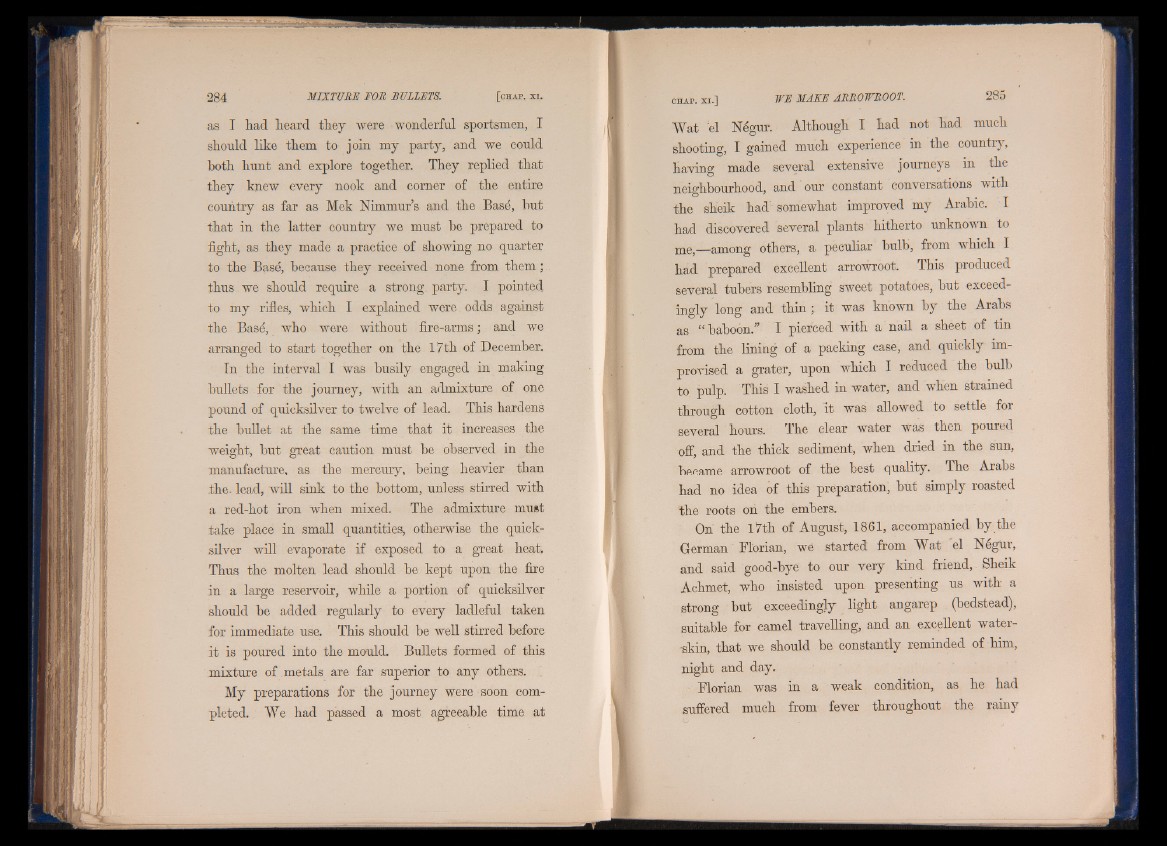
as I had heard they were wonderful sportsmen, I
should like them to join my party, and we could
both hunt and explore together. They replied that
they knew every nook and comer of the entire
country as far as Mek Nimmur’s and the Basé, but
that in the latter country we must be prepared to
fight, as they made a practice of showing no quarter
to the Basé, because they received none from them ;
thus we should require a strong, party. I pointed
to my rifles, which I explained were odds against
the Basé, who were without fire-arms ; and we
arranged to start together on the 17th of December.
Tn the interval I was busily engaged in making
bullets for the journey, with an admixture of one
pound of quicksilver to twelve of lead. This hardens
the bullet at the same time that it increases the
weight, but great caution must be observed in the
manufacture, as the mercury, being heavier than
the. lead, will sink to the bottom, unless stirred with
a red-hot iron when mixed. The admixture must
take place in small quantities, otherwise the quicksilver
will evaporate if exposed to a great heat,
Thus the molten lead should be kept upon the fire
in a large reservoir, while a portion of quicksilver
should be added regularly to every ladleful taken
for immediate use. This should be well stirred before
it is poured into the mould. Bullets formed of this
mixture of metals are far superior to any others.
My preparations for the journey were soon completed.
We had passed a most agreeable time at
Wat el Negur. Although I had not had much
shooting, I gained much experience in the country,
having made several extensive journeys in the
neighbourhood, and our constant conversations with
the sheik had somewhat improved my Arabic. I
had discovered several plants hitherto unknown to
me,—among others, a peculiar bulb, from which I
had prepared excellent arrowroot. This produced
several tubers resembling sweet potatoes, but exceedingly
long and thin; it was known by the Arabs
as “ baboon.” I pierced with a nail a sheet of tin
from the lining of a packing case, and quickly improvised
a grater, upon which I reduced the bulb
to pulp. This I washed in water, and when strained
through cotton cloth, it was allowed to settle for
several hours. The clear water was then poured
off, and the thick sediment, when dried in the sun,
became arrowroot of the best quality. The Arabs
had no idea of this preparation, but simply roasted
the roots on the embers.
On the 17th of August, 1861, accompanied by the
German Fl'orian, we started from Wat el Negur,
and said good-bye to our very kind friend, Sheik
Achmet, who insisted upon presenting us with a
strong but exceedingly light angarep (bedstead),
suitable for camel travelling, and an excellent waterskin,
that we should be constantly reminded of him,
night and day.
Florian was in a weak condition, as he had
suffered much from fever throughout the rainy